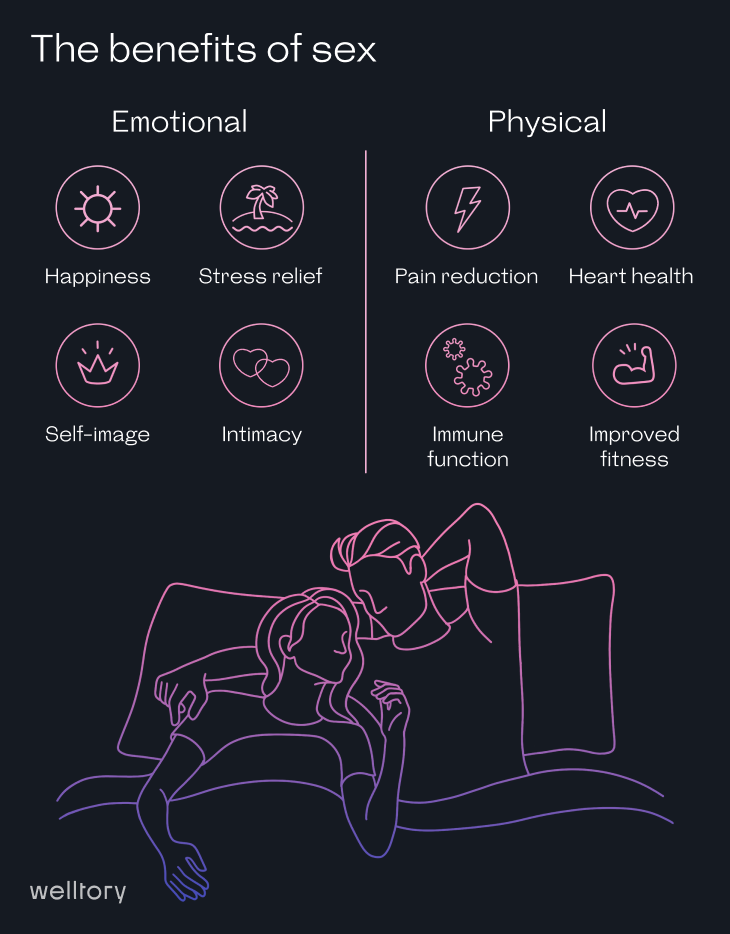

Welltory — All-in-One Wellness App.




Home » Sex & Relationships » Benefits of sex and sex tracking apps
Sex is mediated by hormones and interconnected with lifestyle and health. Regular, consensual sexual and intimate activity with another person causes a release of several neurotransmitters, which can make someone feel calmer, at peace, happy, and connected to others.
Not to worry if you’re flying solo. Researchers note that masturbation is also healthy and good for you, especially if you don’t have a sexual partner. However, while offering a physical release, it does not result in the same type of neurotransmitter release. That doesn’t mean you shouldn’t do it.

Sex is physical exercise, and we know that exercise is good for you. It lowers your blood pressure, reduces stress, improves sleep, strengthens bones and muscles, boosts your immune system, optimizes cardiovascular function, and strengthens your heart.
Intimacy is also an important tool that can keep you physically and mentally healthy. Research suggests that asexual people gain similar befits from their romantic relationships through emotional connection and intimacy that bonds them with their partner. An intimate emotional bond lowers feelings of loneliness, depression, anxiety, and the risk of developing heart disease. Hugs alone can reduce stress and improve immunity.
Sex also boosts your body’s ability to make protective antibodies against bacteria, viruses, and other germs that cause common illnesses. Research suggests that having sex one or two times per week helps boost the immune system by increasing immunoglobulin A (IgA) by 30%. This antibody shows us how tough our immune system is.
Research shows a link between heart rate variability and sexual function that might be bidirectional with HRV reflecting central processes underlying sexual motivation. Lower resting HRV reflects sympathetic and parasympathetic influences and is related to the lesser frequency of penile-vaginal intercourse (PVI) in both sexes, and to the lower sexual arousal and absence of orgasm from PVI in women. If you want to understand what influences your sexual desire, tracking your HRV with Welltory might be a very good idea.
Regular sexual activity increases levels of the male sex hormone testosterone, promoting optimal brain function while helping to strengthen bones and muscles and decrease the risk of obesity, metabolic syndrome, and type 2 diabetes.
A study by Australian scientist Graham Giles showed that high ejaculation frequency between the age of 20 to 50 protects men against prostate cancer. A study published in the British Journal of Urology International shows that ejaculating more than five times a week in your twenties lowers the risk of prostate cancer by a third. It can be explained by an increase in oxytocin and DHEA levels during orgasm.
Researches reported that an active sex life reduces the risk of prostate cancer. The study involved 32 thousand men over 18 years; four thousand of them developed prostate cancer. The researchers found that men aged 40 to 49, who ejaculated 21 or more times a month, had a 22% lower risk of prostate cancer compared with men who reported four to seven ejaculations a month.
In 2001, the same group of scientists found that for men, having sex at least three times a week decreases the risk of a heart attack or a stroke. Lack of sexual activity lowers testosterone levels. It was proven that men with low testosterone are two times more likely to develop Alzheimer’s disease.
There are a lot of benefits of sex for women. Women engaged in regular sexual activity have higher estrogen levels and more regular menstrual cycles than women who have less sex or no sex at all in their life. Estrogen reduces bad cholesterol, increases bone density, makes the skin smoother, and improves cognitive function in women.
Regular sex increases fertility by regulating the menstrual cycle and can also increase reproductive hormones and stimulate ovulation. Scientists suggest that the highest pregnancy rates occur in couples who have sex every day or every other day. Sexual activity can also stimulate a complex interaction between pro- and anti-inflammatory cytokines to decrease midcycle’s inflammation.
Sexual activity during pregnancy can protect against premature birth, especially during the third trimester (between the 29th and 36th weeks). In one study, spontaneous miscarriages were significantly less common in those of 1,800 women who had sex in later pregnancy (excluding those who could not have sex for medical reasons). As long as your pregnancy is going normally, you can have doctor-approved sex as often as you like. Moreover, during sexual arousal, the paraventricular nucleus also releases oxytocin, which helps to stimulate uterine contractions during labor and to release milk during breastfeeding.
“Yes, baby, tonight!”. Orgasm has an analgesic effect. Data suggest that sexual activity can lead to partial or complete relief of headaches. Dr. Anke Hambach from the University of Münster concluded that sexual activity leads to partial or complete relief of a headache in some patients with migraines and a few with cluster headaches. Orgasm is no less effective than pills – indeed, it is faster, cheaper, and has no side effects.
Higher estrogen in women can alleviate pain during premenstrual syndrome. Pain-blocking effects of vaginal stimulation were studied, and results showed that women with regular orgasms have a higher pain threshold for disorders like lumbago or arthritis. It can be explained by the fact that orgasm increases oxytocin and endorphins levels, which relieve pain.
Sex has a lot of physical benefits but what about our mental health? Sexually active people take fewer sick leaves and enjoy life more. Many studies have shown that consensual sexual activity contributes to longevity, promotes mental and physical health, and improves metabolism.
In-depth studies of sexuality made by American researcher Alfred Kinsey in the 1950s found that sex reduced stress. People with a regular sex life were less anxious, aggressive, and hostile. And it was confirmed later by many other studies. Dartmouth College economists David Blanchflower and Andrew Oswald from the University of Warwick (UK) interviewed 16,000 people about their income, sexual behavior, and happiness. It was found that an increase in sexual activity from once a month to once a week was associated with a rise on the “happiness” scale equivalent to $50,000 income.
Researchers also say the happiest couples get intimate and/or make love once a week on average. Having less sex or no intimacy at all often correlates with unsuccessful family life, based on the survey data of 30,000 Americans collected during the last 40 years.

Sex tracking apps and devices are a relatively new but rapidly growing category of health tracking. Liz Klinger, the CEO and Co-founder of one of the sex trackering apps, says that it can be interesting for people who like to track other aspects of their health, people who have questions about their sex life, or people who like to try different things (coffee, CBD, etc.) and see how it might change their pleasure. Some sex trackers include bits of advice for increasing intimacy and give you access to community forums where you can get even more insights from people who are also working on improving their sex lives.
It is quite common for women to use sex tracking and period-tracking apps to monitor their menstrual cycle and sexual health as well as to track their fertility. For example, the Planned Parenthood app helps you understand your cycle and how your birth control method can affect your period. Other period trackers for women that monitor both sex life and menstrual cycles are Flo, Eve by Glow, and PeriodTracker.
A sex calendar diary or an app can be used as an effective tool for tracking your sexual partners. Some apps include information on identifying and tracking symptoms of sexually transmitted infections (STIs), such as irregular vaginal discharge. In cases where STIs were contracted, a sex tracker app can help you narrow it down to who it might have been and who you should call to tell the ‘news’.
The way Rebecca Blanton, sex educator, looks at it suggests that awareness and understanding of how sexual and intimate activities affect you over time and can help men and women stay more emotionally balanced.
“Tracking sexual activity in cohorts with other health indicators may provide insights into fluctuations of one’s mental health. Understanding the connection between sex and how your mood reflects this provides an increased understanding of your psychological health. Tracking sex in connection with mood changes and heart rate variability can give you valuable feedback about inner processes you might not be deeply in touch with.”
If not, then it might be a brilliant idea to start doing so. Tracking your sex life can make it better. It’s like with sports, the more you practice, the better you become at it. Tracking your sexual activity can help you see changes or patterns over time, as well as answer questions like what’s going on, what’s working, and what’s not.
No matter your gender or anatomy, sex drive, pleasure, arousal, and pain can all be impacted by a variety of factors such as stress, health, relationships, and more. We all experience these, so tracking and seeing changes over time can help anyone have a healthier, happier, and more satisfying sex life — and life in general, says Liz Klinger.
The “Nice” app, for example, is one of the best apps for sex tracking for iOS that enables you to track when you had sex, whether you used contraception, location of sexual encounters, and different sexual activities you participated in with different partners. Sex Tracker Logger Calendar app for Android enables the same kinds of features as the app Nice.
Fascinating research published in 2020 analyzed the usage of sex tracker apps by women. Based on responses from 130,885 women in 191 countries, research suggests that globally, 11% reported having used an app or mobile device to improve their sexual relationship. Very few women reported that the app they used to improve their sexual relationships was detrimental (0.2%) or not useful (0.6%).
Men can also benefit from tracking their sex life to better understand changes in their sexual function and satisfaction, much like women can. There are more similarities than we might think around sexual function between different sexes, says Liz Klinger.
We all wondered about it at least once… It’s not really the quantity but the quality of sex that matters if we are talking about the single intercourse. A 2005 study showed that the average time across 500 couples participating in the survey was 5.4 minutes. Some couples had it for 33 seconds and some for 44 minutes. There is no ‘normal’ amount of time to have sex as long as it makes partners happy. Tracking these numbers might be a good idea if you are not satisfied with your own performance or want to bring it to the attention of your partner. Some people respond to data really well and it might be helpful to track your changes over time to improve your performance.

Welltory Team, upd. 21 Oct. 2021
 App Store
App Store
 Google Play
Google Play
 Huawei AppGallery
Huawei AppGallery
 Galaxy Store
Galaxy Store

